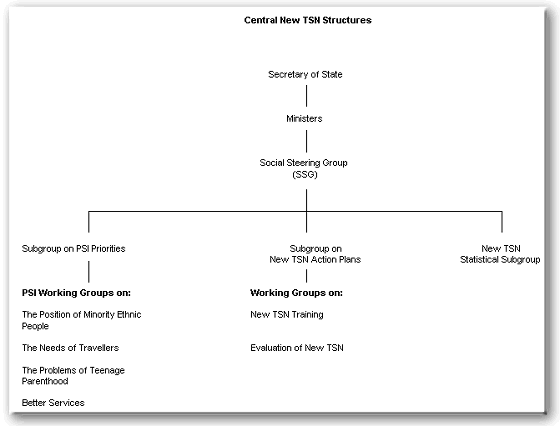3.
3.1
3.1.1
Implementing New TSN
The Role of Ministers
The engine driving New TSN is the Northern Ireland Ministerial Team. The Secretary of State has direct political responsibility for the overall policy. Individual Ministers have active roles in promoting it and ensuring progress within their respective Departments.
3.2
3.2.1
Central Structures
Partnership for Equality made it clear that much of New TSNs success would depend on the vigour with which Departments pursued their New TSN responsibilities. However, it would also be essential to have a strong central drive at official level and for Departments to work together in a co-ordinated way.

CCRU translated the broad commitments in the White Paper into an agenda of action for itself, SSG and Departments; this was issued as Central Secretariat Circular 2/98 in July 1998. CCRU also published New TSN: an agenda for Targeting Social Need and Promoting Social Inclusion to accompany the Secretary of States launch of New TSN on 28 July 1998. This publication attracted considerable attention and about 5,000 copies have been distributed.
3.3
3.3.1
Departmental Commitments
For Departments successfully to implement New TSN, it must feature in their planning and be firmly embedded in their cultures. At official level, Top Management must demonstrate their commitment to it, convince staff in relevant Business Units of its importance, and ensure that these staff have the knowledge and understanding to apply New TSN within their respective spheres of responsibility. This process has already started but more remains to be done.
Departments are building New TSN into their aims and strategic plans. They have established structures for co-ordinating its implementation and for monitoring progress. New TSN training will be provided for staff directly involved in the implementation of the policy. Departments will disseminate information about progress and good practice to staff as appropriate. They will work with relevant NDPBs to ensure that these Public Bodies have the information and guidance they need to finalise their own Action Plans by 1 January 2001.
3.4
3.4.1
Progress
Since New TSN was launched in July 1998, there has been progress across a range of New TSN-relevant policy and programme areas. For example:
- 4,600
young people have found employment through New Deal for 18-24 year olds,
and New Deal for 25+ was piloted in Northern Ireland as part of the
Chancellor's initiative from November 1998
- an
additional £39m has been made available to the further education sector
for Lifelong Learning. New initiatives under Lifelong Learning include
an Access Initiative to increase participation of previously excluded
groups, funds to encourage colleges to recruit students to vocational
courses in skills shortage areas and new funding formulae to help students
in receipt of certain benefits
- under
the Pre-School Expansion Programme, places have been provided for 70%
of children in their pre-school year; new places are targeted at children
from disadvantaged backgrounds
- the
first 2 Health Action Zones have been set up, involving partnerships
between statutory, private, voluntary and community sectors in addressing
public health issues in deprived areas; each received £150,000 funding
from DHSS
- a policy document on Traveller Accommodation was launched on 11 August 1999 and the Northern Ireland Housing Executive (NIHE) now has the lead role in assessing Travellers' accommodation needs and managing Traveller accommodation.
|
|